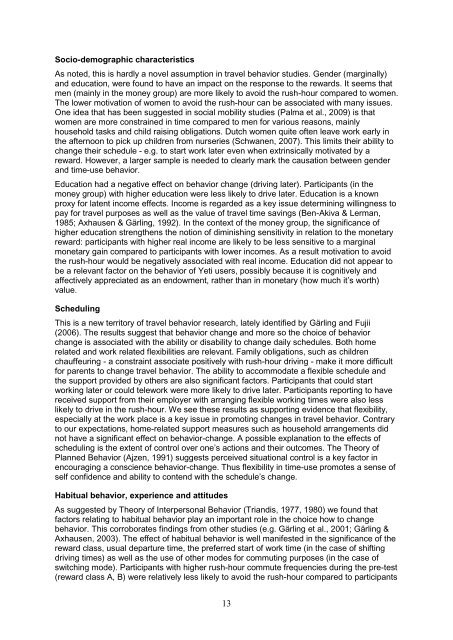Ben-Elia, E. and Ettema, D. (2011) Changing commuters' behav- ior ...
Ben-Elia, E. and Ettema, D. (2011) Changing commuters' behav- ior ...
Ben-Elia, E. and Ettema, D. (2011) Changing commuters' behav- ior ...
You also want an ePaper? Increase the reach of your titles
YUMPU automatically turns print PDFs into web optimized ePapers that Google loves.
Socio-demographic characteristics<br />
As noted, this is hardly a novel assumption in travel <strong>behav</strong><strong>ior</strong> studies. Gender (marginally)<br />
<strong>and</strong> education, were found to have an impact on the response to the rewards. It seems that<br />
men (mainly in the money group) are more likely to avoid the rush-hour compared to women.<br />
The lower motivation of women to avoid the rush-hour can be associated with many issues.<br />
One idea that has been suggested in social mobility studies (Palma et al., 2009) is that<br />
women are more constrained in time compared to men for various reasons, mainly<br />
household tasks <strong>and</strong> child raising obligations. Dutch women quite often leave work early in<br />
the afternoon to pick up children from nurseries (Schwanen, 2007). This limits their ability to<br />
change their schedule - e.g. to start work later even when extrinsically motivated by a<br />
reward. However, a larger sample is needed to clearly mark the causation between gender<br />
<strong>and</strong> time-use <strong>behav</strong><strong>ior</strong>.<br />
Education had a negative effect on <strong>behav</strong><strong>ior</strong> change (driving later). Participants (in the<br />
money group) with higher education were less likely to drive later. Education is a known<br />
proxy for latent income effects. Income is regarded as a key issue determining willingness to<br />
pay for travel purposes as well as the value of travel time savings (<strong>Ben</strong>-Akiva & Lerman,<br />
1985; Axhausen & Gärling, 1992). In the context of the money group, the significance of<br />
higher education strengthens the notion of diminishing sensitivity in relation to the monetary<br />
reward: participants with higher real income are likely to be less sensitive to a marginal<br />
monetary gain compared to participants with lower incomes. As a result motivation to avoid<br />
the rush-hour would be negatively associated with real income. Education did not appear to<br />
be a relevant factor on the <strong>behav</strong><strong>ior</strong> of Yeti users, possibly because it is cognitively <strong>and</strong><br />
affectively appreciated as an endowment, rather than in monetary (how much it’s worth)<br />
value.<br />
Scheduling<br />
This is a new territory of travel <strong>behav</strong><strong>ior</strong> research, lately identified by Gärling <strong>and</strong> Fujii<br />
(2006). The results suggest that <strong>behav</strong><strong>ior</strong> change <strong>and</strong> more so the choice of <strong>behav</strong><strong>ior</strong><br />
change is associated with the ability or disability to change daily schedules. Both home<br />
related <strong>and</strong> work related flexibilities are relevant. Family obligations, such as children<br />
chauffeuring - a constraint associate positively with rush-hour driving - make it more difficult<br />
for parents to change travel <strong>behav</strong><strong>ior</strong>. The ability to accommodate a flexible schedule <strong>and</strong><br />
the support provided by others are also significant factors. Participants that could start<br />
working later or could telework were more likely to drive later. Participants reporting to have<br />
received support from their employer with arranging flexible working times were also less<br />
likely to drive in the rush-hour. We see these results as supporting evidence that flexibility,<br />
especially at the work place is a key issue in promoting changes in travel <strong>behav</strong><strong>ior</strong>. Contrary<br />
to our expectations, home-related support measures such as household arrangements did<br />
not have a significant effect on <strong>behav</strong><strong>ior</strong>-change. A possible explanation to the effects of<br />
scheduling is the extent of control over one’s actions <strong>and</strong> their outcomes. The Theory of<br />
Planned Behav<strong>ior</strong> (Ajzen, 1991) suggests perceived situational control is a key factor in<br />
encouraging a conscience <strong>behav</strong><strong>ior</strong>-change. Thus flexibility in time-use promotes a sense of<br />
self confidence <strong>and</strong> ability to contend with the schedule’s change.<br />
Habitual <strong>behav</strong><strong>ior</strong>, experience <strong>and</strong> attitudes<br />
As suggested by Theory of Interpersonal Behav<strong>ior</strong> (Tri<strong>and</strong>is, 1977, 1980) we found that<br />
factors relating to habitual <strong>behav</strong><strong>ior</strong> play an important role in the choice how to change<br />
<strong>behav</strong><strong>ior</strong>. This corroborates findings from other studies (e.g. Gärling et al., 2001; Gärling &<br />
Axhausen, 2003). The effect of habitual <strong>behav</strong><strong>ior</strong> is well manifested in the significance of the<br />
reward class, usual departure time, the preferred start of work time (in the case of shifting<br />
driving times) as well as the use of other modes for commuting purposes (in the case of<br />
switching mode). Participants with higher rush-hour commute frequencies during the pre-test<br />
(reward class A, B) were relatively less likely to avoid the rush-hour compared to participants<br />
13

















